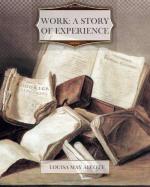Mr. Power and the Wilkinses made them friends very soon; and in an hour or two Christie was moving about the kitchen as if she had already taken possession of her new kingdom.
“Thee likes housework I think,” said Mrs. Sterling, as she watched her hang up a towel to dry, and rinse her dish-cloth when the cleaning up was done.
“Oh, yes! if I need not do it with a shiftless Irish girl to drive me distracted by pretending to help. I have lived out, and did not find it hard while I had my good Hepsey. I was second girl, and can set a table in style. Shall I try now?” she asked, as the old lady went into a little dining-room with fresh napkins in her hand.
“Yes, but we have no style here. I will show thee once, and hereafter it will be thy work, as thy feet are younger than mine.”
A nice old-fashioned table was soon spread, and Christie kept smiling at the contrast between this and Mrs. Stuart’s. Chubby little pitchers appeared, delicate old glass, queer china, and tiny tea-spoons; linen as smooth as satin, and a quaint tankard that might have come over in the “May-flower.”
“Now, will thee take that pitcher of water to David’s room? It is at the top of the house, and may need a little dusting. I have not been able to attend to it as I would like since I have been alone,” said Mrs. Sterling.
Rooms usually betray something of the character and tastes of their occupants, and Christie paused a moment as she entered David’s, to look about her with feminine interest.
It was the attic, and extended the whole length of the house. One end was curtained off as a bedroom, and she smiled at its austere simplicity.
A gable in the middle made a sunny recess, where were stored bags and boxes of seed, bunches of herbs, and shelves full of those tiny pots in which baby plants are born and nursed till they can grow alone.
The west end was evidently the study, and here Christie took a good look as she dusted tidily. The furniture was nothing, only an old sofa, with the horsehair sticking out in tufts here and there; an antique secretary; and a table covered with books. As she whisked the duster down the front of the ancient piece of furniture, one of the doors in the upper half swung open, and Christie saw three objects that irresistibly riveted her eyes for a moment. A broken fan, a bundle of letters tied up with a black ribbon, and a little work-basket in which lay a fanciful needle-book with “Letty” embroidered on it in faded silk.
“Poor David, that is his little shrine, and I have no right to see it,” thought Christie, shutting the door with self-reproachful haste.
At the table she paused again, for books always attracted her, and here she saw a goodly array whose names were like the faces of old friends, because she remembered them in her father’s library.
Faust was full of ferns, Shakspeare, of rough sketches of the men and women whom he has made immortal. Saintly Herbert lay side by side with Saint Augustine’s confessions. Milton and Montaigne stood socially together, and Andersen’s lovely “Märchen” fluttered its pictured leaves in the middle of an open Plato; while several books in unknown tongues were half-hidden by volumes of Browning, Keats, and Coleridge.




